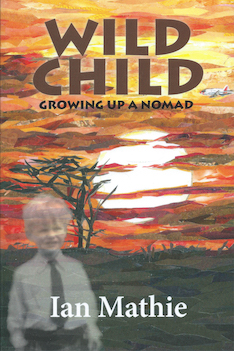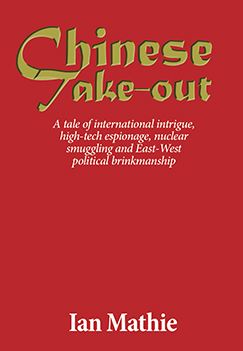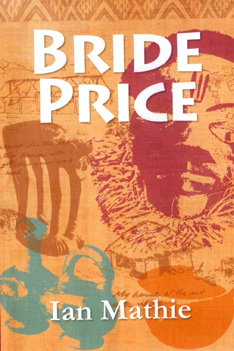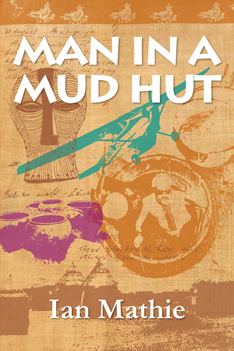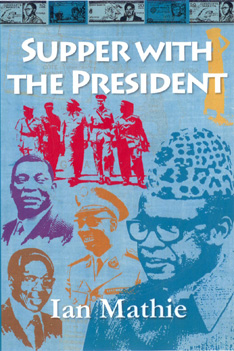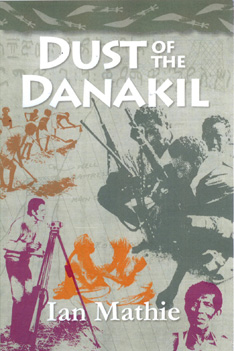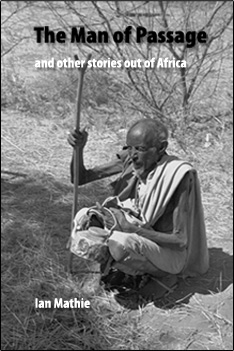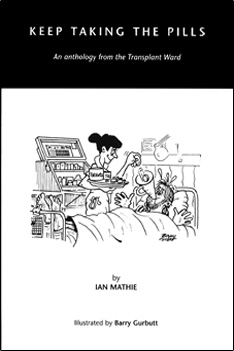Home > Reviews > Sorcerers and Orange Peel
Reviews of Sorcerers and Orange Peel
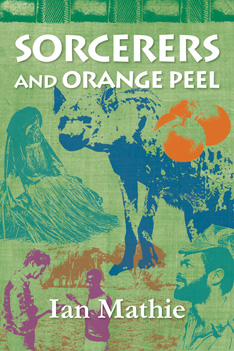
 Recommended as one of the Top Ten Autobiographies of 2014 by The Bookbag
Recommended as one of the Top Ten Autobiographies of 2014 by The Bookbag
A selection of reviews appear below; for more reader's comments on Sorcerers and Orange Peel go to amazon.co.uk.
"I can't understand why Ian Mathie isn't a more celebrated writer and commentator on African cultural affairs. I've never yet heard him on radio, re-telling episodes from his memorable life. Our loss. Africa is moving forward, but to understand the Africa of today we need to pay attention to its recent past as well as its early colonial history. Ian's unassuming witness of African tribes as they slowly emerged into the world of the 1970’s is unparalleled for its authenticity and depth of experience. This recent memoir is his best constructed yet; a seriously informative tale for anyone who wants to know about the real Africa beneath the surface of today’s mobile phones and pre-loved designer jeans.
Ian Mathie worked for the UK government as a water resources engineer in several North and West African countries. At this time, most of his subsistence farmer partners had never seen a white man, for the obvious reason that communications were infinitely worse forty years ago than they are today. This single fact explains the necessity of being able to fly a light plane, including clearing landing strips, or mending any part of a Land Rover from the tools he carried on board, quite apart from the daily inventivenss needed to bring water to dry areas. Think on, this simple fact also made complete self-sufficiency a given for his forays, by which I mean carrying enough water, food, medical supplies, tools and spares for weeks in the field at a time. Ian’s style was to pick over every scrap of help he gleaned from indigenous or educated sources. He doesn’t actually tell us much about his meticulous planning, but we can learn from his pragmatic attitude and humanitarian mindset. This book better prepares us mentally to face floods, storms and whatever else the weather throws at us in the next few months and years.
Brought up in Africa, Ian could usually make himself understood to local tribesmen. Importantly, his respect and fascination for tribal customs ensured that he was welcomed into local houses, including, in this book, finding himself initiated into an adoptive family by a traditional ceremony. Along the way he ruins his sump on an termite mound and stays in a House of Death, which turns out a most unusual traveller’s rest.
Sorcerers and witch doctors abound through this region of West Africa. Ian Mathie reports only what he has seen, felt and heard, and he is clearly not unduly imaginative or sensitive. Since I have developed a high regard for Ian’s veracity, built over five books, I believe that the mysterious events he describes undoubtedly occurred. It is up to the reader to supply a scientific explanation for extraordinary happenings.
Finally, Ian tells a interesting cautionary tale of commercial partnership between First and Third World. He managed to source a French perfumier to buy citrus oil harvested from an unwholesome area of orange groves. But as so often, African enterprise peters out after a few years. For all these reasons, I suggest you read this inspiring memoir, with its salutory message of reality.
I'd like to thank the publishers for sending a beautifully-polished narrative. Far too often, I review books where it’s clear that insufficient time spent editing newer authors’ writing is the major downfall of the work. It’s a real pleasure to read a book, for once, where the editing is as tight as the writing.
"Ian Mathie has written a very interesting book; one that many Western readers, however, may find strange and mysterious. Sorcerers and Orange Peel does more than provide a fascinating window into the world of African development aid from Mathie’s years spent interacting with the peoples of that continent as a water resources specialist. Its true charm is that it takes at absolute face value the beliefs and spiritual practices of those people at that time, providing a richly observed account of the rituals and societal convictions of rural groups who had had very little contact with white people up to that period. I suspect that many of these conventions have been eroded by the surge into modernity that Africa has undertaken in the last three decades. In that sense, Mathie’s book serves as a valuable anthropological record of the ways that sorcery and the supernatural were then as much a part of everyday African life as were the weather and the passing of the seasons.
In addition, the book provides historical insights into the efforts of aid workers who were attempting to stimulate local economies through the application of technology and access to markets, ranging over great, largely unbounded distances to open up potential for communal livelihoods that went beyond pure subsistence. Mathie provides an especially vivid picture of how these projects could take shape through the initiative of specialists who were able to react to the circumstances and opportunities they encountered in a fairly spontaneous manner. I imagine that the level of financial freedom they operated with has also been systematically eroded by today’s accountability processes and organizational red tape, not to mention security concerns and the rise of banditry. His story takes place in what was altogether a less regulated and more innocent time.
I enjoyed this book and look forward to reading more in Mathie’s series of memoirs about his other African experiences."
Bruce Nicoll
"This is one of the best books I've read in a long, long time. It's different - no romance, no crime - but it's very immersive- I don't recall ever reading a book that I felt put me in the story like this one does. Lovers of Africa, indigenous religions, and perfume will all find something to adore here.
It's really nice, too, to be engaged with the author - who is clearly a very, very good person with tons of natural, easy compassion, and an awesome writer.
I read it slow - it wasn't that it was not a page turner, but it was just that it was so good at transporting me to the setting - I could only take so much time in the African bush at a time. I'd read a few chapters, then think about it for a week or two. Then I'd eagerly read a few more. Once I got used to the environment, about halfway through the book, I read the rest quickly.
I love this book - I felt like I took an African vacation back in time."
Kristi Gilleland
"I don’t believe in magic.
It seems odd to have to say that, but it's just that Ian Mathie, the author of Sorcerers and Orange Peel, seems to. The book's one in a series of memoirs about his years as a water resources specialist in West Africa, and it tells of his dealings with witchcraft, devils, spells and all sorts of sinister joggery-pokery.
But I don't believe in magic. Hyenas don't turn into men and men don't turn into hyenas, whatever Mathie says.
But there's the rub. It’s a book about what he saw and what he believes, and he's a practical, no-nonsense character who used to work technological magic of his own in providing drinking water for remote villages, sorting out drainage problems, and advising on irrigation projects. As a sideline, he nurses an ailing couple back to health with the contents of his medicine kit. Hell, he even repairs a cracked sump on his Landrover with a couple of corned beef tins. He’s nobody's fool.
And yet. "When I looked back, the hyena was gone. In its place stood a man, cloaked in tufts of raffia and animal skins, among which the blotchy pelt of a hyena was prominent …"
It's gripping – the capable, practical European engineer faced with a shadowy world of magic, and apparently seduced by it, although you probably wouldn't tell him so to his face. And whatever you think of the magic, the writing is first class. You can feel the musty atmosphere inside the hut as he bends over the dying man and his wife, smell the mixture of smoke, pungent citrus leaves and rank sweat as the sorcerer stirs the fire.
And by the time you’ve finished the book, you'll start believing in the magic yourself. Not that I did, of course. But on the other hand …."
Andrew Taylor, Author
"Ian Mathie was recommended to me because of the connection to the relatively new category “Magic Realism”, a category that intrigued me. This is a work of non-fiction. I emphasize that because if I had stumbled upon it without being aware it might have taken me a bit to understand that this is NOT fiction. Mathie has worked and travelled extensively throughout regions in Africa where western influence has been minimal, where old customs and belief systems have remained largely intact, where spirits still are felt and have influence on events. Mathie has had first-hand contact with many of these and vouches for their existence in the real world.
In this partial memoir Mathie takes us with him as he encounters personal challenges, challenges a spirit guide for the lives of an elderly couple, undergoes the rites of adoption, and meets shamans and spirits who change the course of his life and that of the villagers he meets. Keep an open mind and you will come to accept that such things still happen. The alternative become less believable and you will be drawn into a greater appreciation of the diversity of spiritual possibilities and realities.
Far from being a dry factual narrative Mathie writes in a natural story-telling style that is pleasant and easy to read. The situations he finds himself in are sometimes scary, sometimes touching and often challenging to our western way of thinking. He is generous with his personal reactions and insights, his questions and the admission that he is a still a beginning student of a world that is known intimately by the people he encounters. We learn with him as we read but never feel preached to.
I will be reading more from this author."
Yvonne Hertzberger, Author of the Earth’s Pendulum trilogy
"Ian Mathie is a practical man with mystical connections. In this fifth volume of his African memoirs, he constantly juxtaposes both aspects of his life there in a way that grips the reader. In the wilderness of his opening chapter, he moves between trying to repair his broken sump without any proper patches or solder, and dealing with a strange man who appears and disappears, sometimes assuming the appearance of a hyena. In a village, he teaches the science of water filtration while undergoing an initiation rite that opens him to ancestral spirits. In order to extract the valuable oil from groves of orange trees (providing a cash economy for an impoverished village) he has to fly his plane to the next country and enlist the services of a 'devil' to lift an ancient curse on the bitter fruit.
And so it goes. Free from sensationalism, he simply recounts what he has seen and experienced. He writes of village life, marriage customs, feasts and tribal ceremonies,making light of his adaptation to primitive living. He can sleep on the top of his Land Rover, swallow obnoxious home brew or potions, and work shoulder to shoulder in the hard labour of installing water filtration equipment. He has an overseeing role in the training of local people to continue the improvements he has initiated. And he is a kind man, ready to help and nurture when needed.
The book includes maps and photographs helpful to a reader who is unfamiliar with the vast continent in the 1970s. The people are gone now. As such, this is a valuable slice of history to be savoured and admired."
Margaret Sutherland, Author of: A New England Romance
"After reading and reviewing all four previous volumes of Ian Mathie’s series of African memoirs, I was champing at the bit for release of Sorcerers and Orange Peels. When I finally received my copy and sat down to read, I was immediately spellbound. Mathie doesn’t waste a word on preliminaries. On the first page a bizarre combination of circumstances drew him into an eerie encounter with an elderly couple who appeared to be dying. Undeterred by signs of witchcraft around the hut they occupied, he rendered assistance. Abandoning them once again was not an option. His Land Rover was impaled on a termite mound. It took him many days to dig the mound away with only his hands and a simple shovel. During this time, he encountered a terrifying hyena and witch doctor, and eventually restored the couple to health. Reading Mathie’s reflections on these experiences heightened the tension since he didn’t know what to do himself. The tension carried on as he returned the couple to their village. There he was confronted by another sorcerer as well as skeptical villagers.
After returning to his own village, two women who owned a laundry requested his help to create a source of fresh, clean water. During this adventure more dots connected, leading him to realize the inedible bitter oranges growing rampant near the first village could have the potential to offer those people a source of income. While pursuing this line of thinking, he was adopted into yet another tribe (he eventually belonged to several), an extraordinary and taxing ordeal. His out-of-the-box thinking led him to an airplane mechanic who used a bit of this and a piece of that to create a device for extracting orange essence. Mathie overcame the resistance of the village chief and sorcerer, worked with yet more sorcerers to remove a curse from the orange grove, found a buyer … the challenges seemed endless and kept me flipping pages to a surprising conclusion.
A few elements in this book carried over from earlier volumes. Mathie’s compassion, open mind, and broad perspective are evident in every volume he writes. He was still based in Anéhigouya, the village where he lived in Bride Price and Man in a Mud Hut. He was still advised by his friend, the Wa-Wa man, who was the Anéhigouya witch doctor. He was still helping villagers obtain clean, safe water supplies and creating innovations from materials at hand. Perhaps the most fascinating thread running through all the books is his experience with sorcerers. He recounts magical experiences that defy human understanding — even his own. I get goose bumps reading about these mystical moments, yet I have no doubt things happened just as he says.
I can’t say which is more inspiring — the example he sets of resourcefulness and innovation, his dedication to causes and persistence in achieving results, or his adaptability and willingness to meet the unknown head-on. I devoutly hope he will continue to add volumes to this series, because I don’t want to quit reading about this time and place and these people who have been relegated to history books. The way of life he writes about has been over-written by political upheaval and technology. It is immortalized by his words. I salute his tribute to the people he obviously loved as his own."
Sharon Lippincott, Author of the Heart and Craft of Life Writing, and Life Writing Coach
"This is the fourth book I have read by Ian Mathie. What makes it so intriguing is that they are true stories. Very well written and offers a glimpse into lives I feel I know. Well done."
DGC

